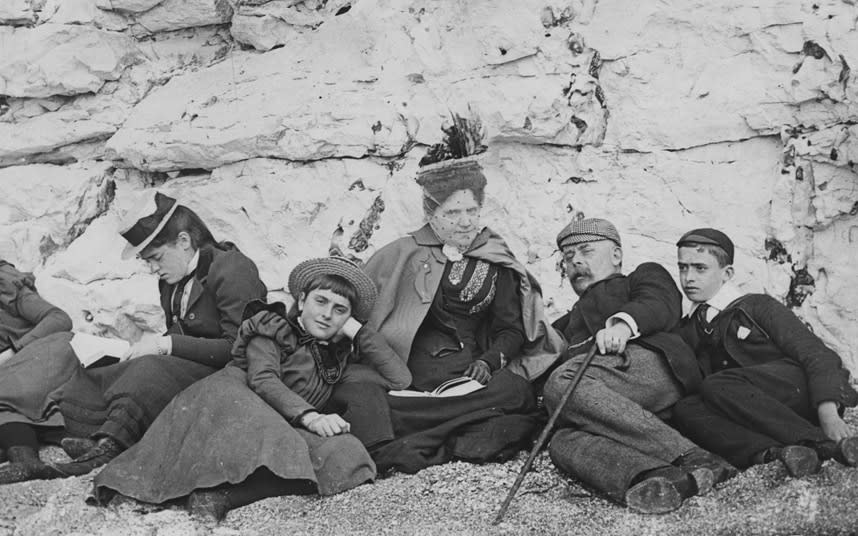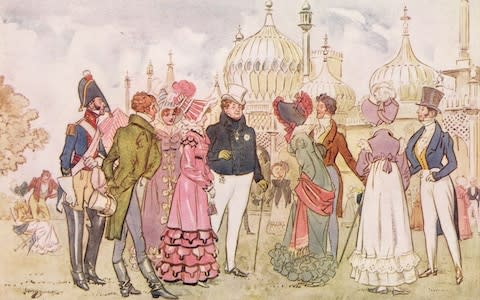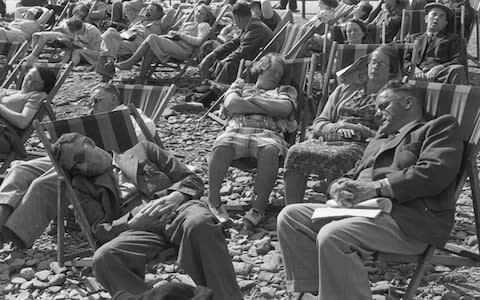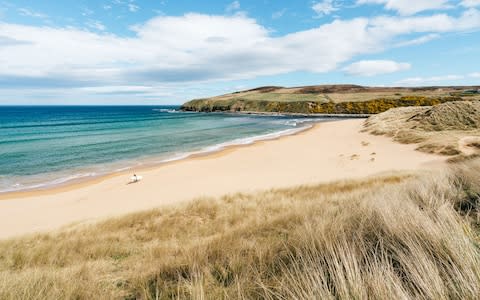How an English vicar invented the beach holiday

The British invented the seaside. Other nations will surely contest this claim, but the historical evidence is unambiguous. This year, on July 22, the world will celebrate 283 years since a British man and his wife first had the brilliant idea of going to the beach.
Already I can feel incensed readers preparing to contradict me, their fingers poised above their keyboards to post hostile comments. What are you on about? How can you prove? Surely, the Romans at Ostia? Hawaiians with their surfboards? Sappho on Lesbos?
Of course, in the two million or so years of human evolution, some of our ancestors must have thought it would be nice to lie on the shingle listening to the sound of the waves, but until a fossilised sun-lounger turns up on the Yucatan Peninsula, until we unearth a bog-body in a pair of Bronze Age Vilebrequin trunks, who should take the credit for discovering the modern world’s favourite holiday? Stand up, Reverend William Clarke, pioneering beach-bum.
In 1736, Reverend Clarke sent this smug proto-postcard to his friend Mr Bowyer: “We are now sunning ourselves upon the beach at Brighthelmstone… The place is really pleasant; I have seen nothing in its way that outdoes it… My morning business is bathing in the sea, and then buying fish; the evening is riding out for air, viewing the remains of old Saxon camps.”
Here is the genius of the true innovator. It takes Steve Jobs decades of tinkering to develop the iPad, it takes Henry Ford years to get his assembly lines in place in Highland Park, Michigan. But, virtually overnight, Reverend Clarke has sketched the template of a beach holiday that will remain unchanged right up to the present day.

Taking the water
Everything is here: loafing in the sunshine, swimming, seafood, the need to boast about it all to a friend, and even the slight guilt at enjoying such a brainless pleasure for which he compensates by pretending he’s also been taking part in an improving cultural activity (Saxon camps, yeah, right!).
Reverend Clarke’s discovery might well have languished in obscurity like other brilliant but badly timed inventions, were it not for this stroke of luck: the benefits of the beach holiday were very quickly given spurious medical reinforcement by a celebrity doctor.
Brighton-based quack Dr Richard Russell published a treatise in 1750 extolling the benefits of seawater: being near it, being in it, and even drinking it. The doctor’s advice sparked an upper-class rush to the seaside. A holiday industry was born, consisting of bathing machines – like horse-drawn allotment sheds – and brawny local fisherfolk called dippers who helped posh hypochondriacs get in and out of the waves.

Dr Russell also advised his patients to drink seawater to stimulate their digestive systems. A pint of it, the wise doctor counselled, was “commonly sufficient, in grown persons, to give three or four sharp stools.” The doctor’s regime was endorsed by the Royal family. The Prince Regent, later George IV, came to Brighton to cure his goitre, built a house and did for the seawater cure what Gwyneth Paltrow has done for the gluten-free diet.
From Regency Britain, it’s a straight line to the present day: resorts were built around the British coast, the expansion of leisure and the spread of railways gave day-trippers the chance to get to the seaside. Piers followed, and donkey rides, tooth-rotting confectionery, fish and chips in newspaper, Donald McGill’s saucy postcards, and Mods and Rockers punching each other silly on bank holiday weekends.
The world's innovators
And then, as with all British ideas, going to the seaside was exported and turned into a vast international business. Even the most one-eyed patriot would admit British beach-going was decisively improved when it went global. Dr Russell’s slighly mad, pseudo-medical rationale for sea-bathing softened as the practice arrived in warmer climates. European beaches with limpid water, good food, and reliable sunshine transformed a purgatorial ordeal into something unambiguously pleasurable.

Today, as you survey Europe and its plenitude of extraordinary beaches – the dazzling golden sands of the Île de Ré, the red cliffs of the Algarve, the lagoons of Greece – you have to remind yourself that it all started with an obscure 18th-century clergyman taking a few days off in Brighton.
Of course, there’s another reason why the beach holiday took off in the way it did – and why it’s likely that some of our nameless ancestors were there before the Reverend: being at the seaside is one of life’s great pleasures. It may not be true for everyone, but for a lot people, me included, the beach is heaven.
The mysterious powers of the sea
In fact, just thinking about the beach on a cold winter day fires the pleasure centres in my brain. Sometimes, at night, when I can’t sleep, I drift off by imagining I’m on the beach, and being lulled by the sound of waves. Why should this be? The descendants of Dr Russell have proposed lots of explanations: the negatively charged ions in the sea air, the sun’s rays shining on your pineal gland, the hypnotic slosh of the surf calming your careworn soul. There might be a grain of truth in these.

In Blue Mind, the scientist Wallace J Nichols examines the deep human bond with water and its many benefits to our health. According to various studies cited in his book, the mere sound of water produces changes in the brain that indicate relaxation. Being in or near the water improves our mood, our sense of connectedness, and even our creativity. To support his argument, Nichols notes that Benjamin Franklin, Vladimir Nabokov, and Edmond Rostand, author of Cyrano de Bergerac, all liked writing in the bathtub. Case closed.
These are fascinating speculations – but don’t beach-goers instinctively know these to be fact already? And isn’t there another reason for that feeling of well-being? Sitting on the beach means you’re not in the office, a traffic jam or a crowded train. Going to the beach simplifies life to its elemental principles. There’s the sea, there’s the shore, there’s the sky. There’s a towel. There’s a paperback book. And of course, there is a sunshade and high-factor sunscreen. Although, the best time to be on the beach, anyway, is early morning and late afternoon when the sun is at its most benign. Midday, surely, is for long lunches and excursions to Saxon forts.
Everywhere else implies another destination, but the beach is it. You can go no further. In an increasingly crowded world, there is elbow room on the beach, space for children to run, and the distant horizon is a glimpse of infinity.
Remind yourself of the art of doing nothing
Many things seem bigger in memory than they do when you encounter them again as an adult. But the sea never gets smaller. Its size and motion still provoke awe and contemplation. The seaside still fills every sense: the smell of brine, hot sand and sunscreen; the sound of water; vivid colours; the warmth of the sun and rough texture of a beach towel; the residual taste of salt on your lips after a swim. Beach lovers have always known about enjoying the moment, about the attentiveness to the present that has been repackaged as mindfulness and touted as the sea-water cure of the 21st century. The beach is the perfect place to remind yourself of the art of doing nothing.
You can simply watch in awe as a redoubtable elderly swimmer sculls the length of the beach using a front crawl as elegant and efficient as the motion of a water beetle. You could even go for a swim yourself. And while there’s a philosophical and even a spiritual aspect to the beach, a beach is not a cathedral or a monastery, it’s defiantly of the world – it’s not ruined by someone listening to a radio or eating ice cream. And if it is, you can always move your deck chair a little further away.
Swells, salty air and wide horizons
A beach resembles certain very great works of art (I’m thinking of The Canterbury Tales, Byron’s Don Juan and Pushkin’s Evgenii Onegin) where trivialities and silliness manage to reinforce the feeling of cosmic design. The foolish and the transient are embedded in a fragment of eternity. How vast the ocean and sky are! Look at that idiot trying to change behind a beach-towel! Oh, that’s your dad. Isn’t it time for some chips? Do you know the cricket score?

Meanwhile, the gravitational pull of the moon draws the tide away from the cliffs to expose a Jurassic fossil: an ammonite, a horseshoe crab, or a starfish. Life on Earth took its most significant step on a beach 375 million years ago, when our distant four-finned ancestor, tiktaalik, floundered out of the water for the first time. And when we get to the beach we tend to regress to earlier stages of our own evolution. It’s a relief to take off most of our clothes and shed the constraints of modernity. We sit in family groups, light fires – byelaws permitting – and construct primitive shelters. The subadults may hunt or engage in forms of display, while the elders pool their accumulated wisdom in order to forecast the next day’s weather.
We can chart the evolution of our own lives from beaches: the sepia-tinted beaches of childhood, the dissolute beaches of the Balearics or Goa or Thailand, and the beach on which we watch our own children first take faltering steps into the water. Beaches are are as various as a stony shoreline in the Arctic Circle where Chukchi hunters are butchering a walrus and the pebbly strand in Eastbourne on which someone is lighting a disposable barbecue. And yet in some ineffable way they’re all the same beach.
The rock pools are still there at low tide. The smell of the ocean is the same. The same families are sitting in a circle having the same conversation: reminiscing about previous trips to the beach. There is the reassuring sensation that, in spite of the ebb and flow of human empires, nothing much has changed at all since the good Reverend’s time. Except, of course, that like cricket, railways, football and the internet, the beach was Britain’s gift to the world, and with the help of the world – warm water, sunshine, better food – the beach became paradise.
Inspiration for your inbox
Sign up to Telegraph Travel's new weekly newsletter for the latest features, advice, competitions, exclusive deals and comment.


